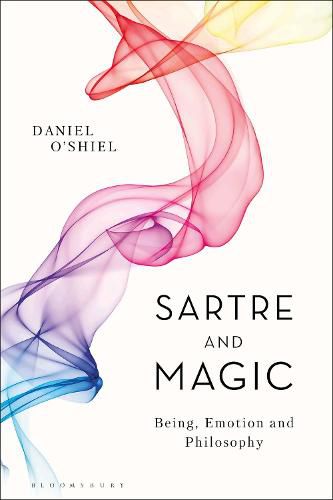Readings Newsletter
Become a Readings Member to make your shopping experience even easier.
Sign in or sign up for free!
You’re not far away from qualifying for FREE standard shipping within Australia
You’ve qualified for FREE standard shipping within Australia
The cart is loading…






Jean-Paul Sartre’s technical and multifaceted concept of magic is central for understanding crucial elements of his early philosophy (1936-1943), not least his conception of the ego, emotion, the imaginary and value.
Daniel O'Shiel follows the thread of magic throughout Sartre’s early philosophical work. Firstly, Sartre’s work on the ego (1936) shows a personal, reflective form of consciousness that is magically hypostasized onto the pre-reflective level. Secondly, emotion (1938) is inherently magical for Sartre because emotive qualities come to inhere in objects and thereby transform a world of pragmatism into one of captivation. Thirdly, analyses of The Imaginary (1940) reveal that anything we imagine is a spontaneous creation of consciousness that has the power to enchant and immerse us, even to the point of images holding sway over us. Culminating with Sartre’s ontological system of Being and Nothingness (1943), O'Shiel argues that Sartre does not do away with the concept, but in fact provides ontological roots for it. This is most evident in Sartre’s analyses of value, possession and language.
A second part shows how such Sartrean magic is highly relevant for a number of concrete case studies: the arts, advertising, racism and stupidity, and certain instances of psychopathology. O'Shiel shows that Sartre’s magical being is important for any contemporary philosophical anthropology because it is essentially at work at the heart of many of our most significant experiences, both creative and damaging.
$9.00 standard shipping within Australia
FREE standard shipping within Australia for orders over $100.00
Express & International shipping calculated at checkout
Jean-Paul Sartre’s technical and multifaceted concept of magic is central for understanding crucial elements of his early philosophy (1936-1943), not least his conception of the ego, emotion, the imaginary and value.
Daniel O'Shiel follows the thread of magic throughout Sartre’s early philosophical work. Firstly, Sartre’s work on the ego (1936) shows a personal, reflective form of consciousness that is magically hypostasized onto the pre-reflective level. Secondly, emotion (1938) is inherently magical for Sartre because emotive qualities come to inhere in objects and thereby transform a world of pragmatism into one of captivation. Thirdly, analyses of The Imaginary (1940) reveal that anything we imagine is a spontaneous creation of consciousness that has the power to enchant and immerse us, even to the point of images holding sway over us. Culminating with Sartre’s ontological system of Being and Nothingness (1943), O'Shiel argues that Sartre does not do away with the concept, but in fact provides ontological roots for it. This is most evident in Sartre’s analyses of value, possession and language.
A second part shows how such Sartrean magic is highly relevant for a number of concrete case studies: the arts, advertising, racism and stupidity, and certain instances of psychopathology. O'Shiel shows that Sartre’s magical being is important for any contemporary philosophical anthropology because it is essentially at work at the heart of many of our most significant experiences, both creative and damaging.